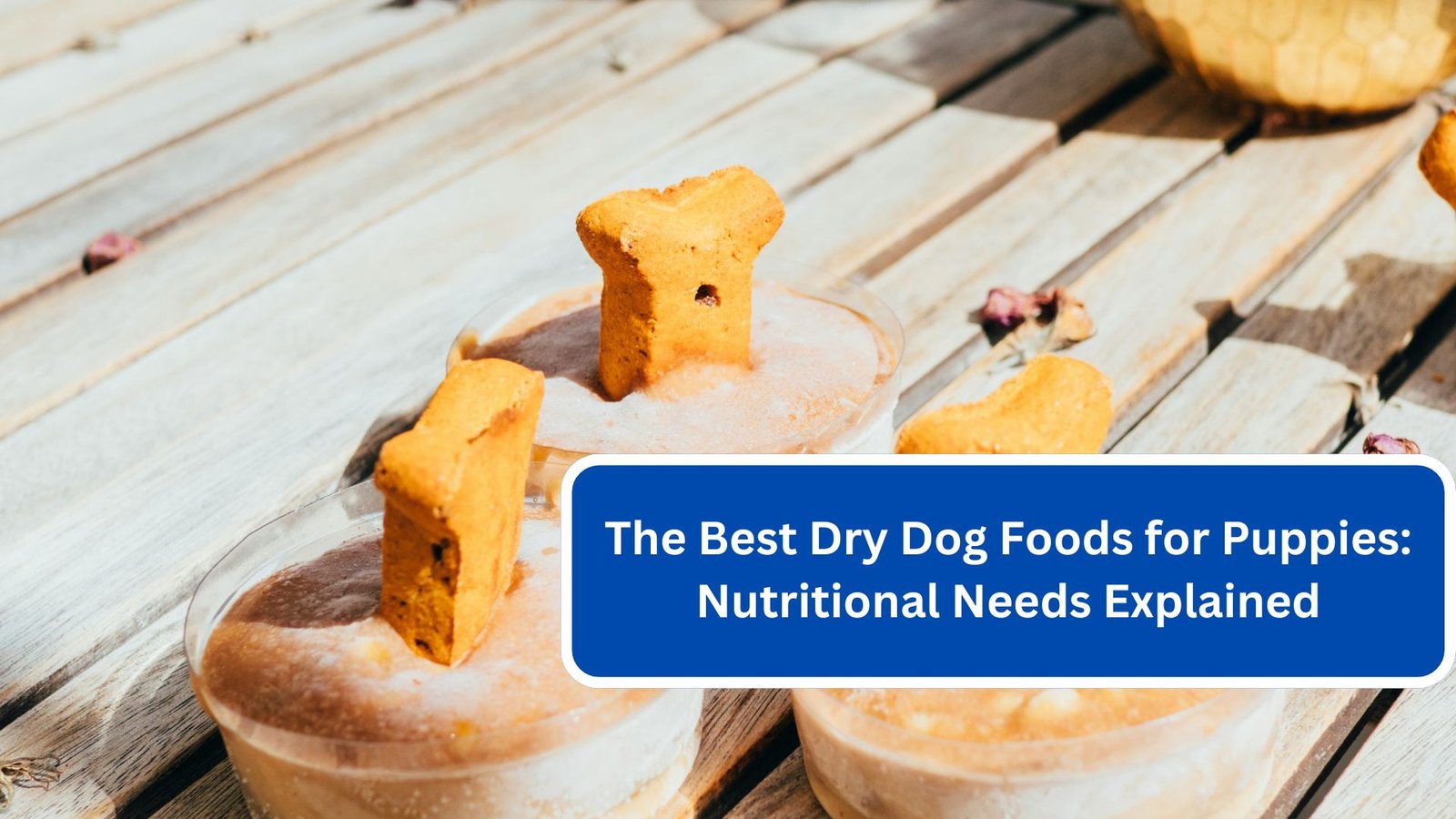Puppies are adorable bundles of energy and curiosity, and their nutritional needs are distinctively different from adult dogs. Choosing the right dry dog food for puppies is crucial for their growth, development, and overall health. This comprehensive guide will delve into the specific nutritional requirements of puppies, highlight the best dry dog foods available in 2024, and explain how to make an informed decision for your furry friend.
Understanding Puppy Nutritional Needs
The Importance of Proper Nutrition
Puppies undergo rapid growth and development, particularly during their first six months. Proper nutrition during this crucial time lays the foundation for a healthy life, supporting muscle development, bone growth, brain function, and immune system strength.
Key Nutritional Components
- Protein: Essential for growth and development, protein helps build muscle and supports various bodily functions. Puppies typically require a higher protein percentage in their diets—around 22% to 32% depending on their breed and size.
- Fats: Healthy fats provide a concentrated source of energy and essential fatty acids necessary for skin and coat health. Look for a fat content of around 8% to 20%.
- Carbohydrates: While not strictly necessary, carbohydrates can provide energy and aid digestion. Look for high-quality sources like sweet potatoes, brown rice, and oats.
- Vitamins and Minerals: Key vitamins and minerals, including calcium and phosphorus, are vital for bone health and overall growth. The right balance of these nutrients is crucial to prevent developmental issues.
- Water: Always ensure that puppies have access to fresh water, as hydration is essential for their well-being.
Choosing the Right Dry Dog Food for Puppies
When selecting the best dry dog food for your puppy, consider the following factors:
Breed Size
- Small Breeds: Puppies of small breeds (e.g., Chihuahuas, Pomeranians) typically have higher metabolic rates, requiring calorie-dense foods formulated for small dogs. Their food should be smaller in kibble size to accommodate their tiny mouths.
- Medium Breeds: Medium-sized puppies (e.g., Beagles, Cocker Spaniels) need balanced nutrition that supports moderate growth rates and energy levels. Look for formulas specifically designed for medium-sized breeds.
- Large Breeds: Large and giant breeds (e.g., Great Danes, Labrador Retrievers) grow rapidly, so their food should have controlled levels of calcium and phosphorus to support healthy skeletal development.
Life Stage
- Puppy-Specific Formulas: Always choose a food labeled specifically for puppies. These formulas are tailored to meet the unique needs of growing dogs, ensuring they receive adequate nutrition for their developmental stages.
Quality of Ingredients
- High-Quality Protein Sources: Look for dry foods where a named meat (e.g., chicken, beef, lamb) is the first ingredient. This indicates that the food contains quality protein essential for growth.
- Avoid Fillers and By-Products: Steer clear of foods with fillers such as corn, soy, and wheat. These can offer little nutritional value and may lead to digestive issues.
Top Dry Dog Foods for Puppies in 2024
Here’s a list of some of the best dry dog foods for puppies available in 2024, highlighting their unique features and benefits.
1. Hill’s Science Diet Puppy
Overview: Hill’s Science Diet is a reputable brand known for its science-based approach to pet nutrition. Their puppy formula offers balanced nutrition for growth.
- Key Ingredients: Chicken, brown rice, and barley.
- Protein Content: 29%
- Unique Features:
- Enriched with DHA from fish oil for healthy brain and eye development.
- Antioxidants to support the immune system.
- No artificial colors, flavors, or preservatives.
Review Summary: Owners often report noticeable improvements in their puppies’ energy levels and overall health. The kibble is well-sized for puppies, promoting easy chewing.
2. Royal Canin Puppy
Overview: Royal Canin offers breed-specific formulas tailored to the unique needs of different puppy breeds.
- Key Ingredients: Chicken by-products, rice, and corn.
- Protein Content: 27%
- Unique Features:
- Contains a blend of antioxidants for immune support.
- Special kibble size designed for small mouths.
- Supports healthy digestion with prebiotics and fibers.
Review Summary: Many pet owners appreciate the breed-specific formulations. Puppies generally enjoy the taste and digestibility of this food.
3. Blue Buffalo Life Protection Puppy
Overview: Blue Buffalo is known for its natural ingredients and high-quality nutrition. Their puppy formula focuses on whole food ingredients.
- Key Ingredients: Deboned chicken, brown rice, and barley.
- Protein Content: 24%
- Unique Features:
- LifeSource Bits: A blend of antioxidants, vitamins, and minerals.
- No chicken (or poultry) by-product meals, corn, wheat, or soy.
- DHA and ARA for brain and eye development.
Review Summary: Puppy owners report that their pets thrive on this formula, showing improved coat condition and vitality. The brand’s commitment to natural ingredients is a significant draw.
4. Merrick Grain-Free Puppy Recipe
Overview: This grain-free option is great for puppies with sensitivities or allergies to grains.
- Key Ingredients: Real deboned chicken, sweet potatoes, and peas.
- Protein Content: 38%
- Unique Features:
- High in omega fatty acids for skin and coat health.
- No grains or gluten.
- Includes probiotics for digestive health.
Review Summary: Many owners appreciate the grain-free aspect, noting improvements in digestion and energy levels. The high protein content is ideal for active puppies.
5. Purina Pro Plan Puppy
Overview: Purina Pro Plan offers scientifically formulated food with high-quality ingredients designed to support puppies’ growth and development.
- Key Ingredients: Chicken, rice, and oatmeal.
- Protein Content: 28%
- Unique Features:
- Contains DHA for brain development.
- Fortified with live probiotics for digestive health.
- High-quality protein to support muscle growth.
Review Summary: Puppy owners often find their pets enjoy this food and thrive on it. The balance of nutrients is well-suited for growing dogs.
6. Canidae PURE Limited Ingredient Puppy Food
Overview: This limited-ingredient diet is ideal for puppies with food sensitivities or allergies.
- Key Ingredients: Lamb, sweet potatoes, and peas.
- Protein Content: 24%
- Unique Features:
- Made with just 8 key ingredients for optimal digestion.
- Includes probiotics for gut health.
- Grain-free option available.
Review Summary: Many pet owners with sensitive puppies report excellent results with this formula, noting less digestive upset and a better overall condition.
7. Wellness CORE Grain-Free Puppy
Overview: A protein-rich, grain-free formula designed to meet the high energy needs of puppies.
- Key Ingredients: Deboned turkey, chicken meal, and potatoes.
- Protein Content: 38%
- Unique Features:
- Rich in omega fatty acids for skin and coat health.
- Contains probiotics for digestive support.
- No meat by-products, fillers, or artificial additives.
Review Summary: Owners appreciate the high protein content and overall quality. Puppies enjoy the taste, and many experience improved coat health.
Transitioning Your Puppy to Adult Food
As your puppy grows, it will eventually need to transition to adult food. This typically occurs between 12 to 24 months, depending on the breed. Monitor your puppy’s growth and consult with your veterinarian to determine the right time for the switch.
Signs Your Puppy Is Ready to Transition
- Physical Size: When your puppy reaches about 80% of their adult size, it may be time to switch.
- Age: Small breeds may transition earlier (around 12 months), while large breeds may need to stay on puppy food longer (up to 24 months).
- Energy Levels: If your puppy’s energy levels start to plateau, it might indicate they are ready for adult food.
Transitioning Process
- Gradual Change: Over 7-10 days, gradually mix the new adult food with the puppy food, slowly increasing the amount of new food while decreasing the puppy food.
- Monitor Health: Keep an eye on your puppy’s stool consistency and overall health during the transition. Adjust the ratios if necessary.
- Consult Your Vet: Always seek guidance from your veterinarian to ensure you’re making the best choices for your puppy’s ongoing development.
Conclusion
Choosing the best dry dog food for your puppy is an essential step in ensuring they grow up healthy and strong. By understanding their unique nutritional needs and considering factors like breed size, activity level, and ingredient quality, you can make an informed decision that supports their growth and development.
The options highlighted in this guide represent some of the best dry dog foods available in 2024, each tailored to meet the specific needs of puppies. With proper nutrition, your puppy will thrive and grow into a happy, healthy adult dog. Always remember to consult with your veterinarian for personalized recommendations and to ensure you’re providing the best care for your furry friend.

